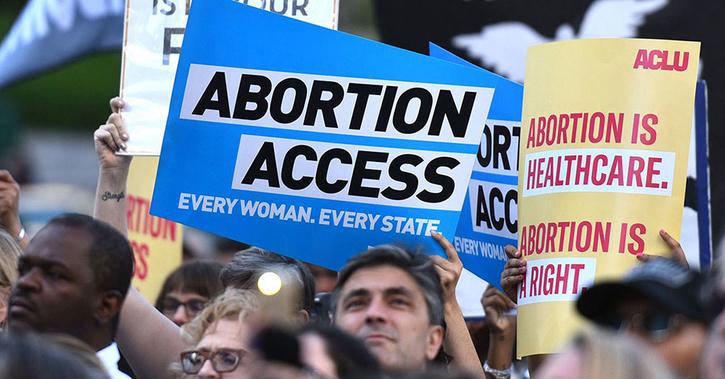As of 2022, abortion laws in the United States vary considerably from state to state. Some states have very restrictive laws that make it difficult or even impossible for women to obtain an abortion, while other states have much more permissive laws that allow women to obtain an abortion with relative ease.

One of the most restrictive states when it comes to abortion in Texas. In Texas, abortion is only legal in cases of rape, incest, or if the life of the mother is in danger. In addition, all abortions must be performed in a licensed hospital or clinic and must be approved by a panel of doctors.
In contrast, California has some of the most permissive abortion laws in the country. In California, abortion is legal at any time during pregnancy for any reason. There are no restrictions on where abortions can be performed, and no approval from a panel of doctors is required.
What is the stand of pro-life advocates?
Pro-life advocates typically believe that abortion is morally wrong and should be illegal in all circumstances. They often cite the fact that abortion involves the taking of human life as their primary reason for opposing it.
Their take is that the fetus is a human being from the moment of conception and, as such, abortion amounts to murder. They believe that abortion should only be allowed in cases where the life of the mother is in danger or in cases of rape or incest.
Pro-life advocates also argue that abortion can have negative psychological effects on the woman who undergoes the procedure. They contend that many women who have abortions experience regret and guilt afterward and that some even suffer from depression and post-traumatic stress disorder.
They also paint a gruesome picture of what happens during an abortion procedure, describing in detail the various methods that can be used to terminate a pregnancy.
What is the stand of pro-choice advocates?
Pro-choice advocates typically believe that women have a right to control their bodies and make their own decisions about whether or not to have an abortion. They often cite the fact that abortion is a personal decision that should be made between a woman and her doctor, and that the government should not be involved in dictating this decision.
They argue that if a woman is forced to have an unwanted child, it infringes on her rights and autonomy. They also argue that abortion can be a necessary procedure to protect the health of the mother and that it should therefore be legal in all cases.
Pro-choice advocates also point to the fact that many women who have abortions do not experience any negative psychological effects afterward. They contend that most women feel relief and happiness after having an abortion and that any guilt or regret is typically short-lived.
They also argue that the methods used to perform abortions are safe and pose no risk to the mother’s health. They argue that pro-life advocates are underplaying the right of women to their lives and their bodies.
What do medical experts say?
Medical experts generally believe that abortion is a safe and effective procedure. They point to the fact that it has been legal in the United States for over 40 years, and that millions of women have safely undergone the procedure.
They also argue that the vast majority of women who have abortions do not experience any negative psychological effects afterward.
However, medical experts do acknowledge that there are some risks associated with abortion, as with any medical procedure. These risks include infection, bleeding, and damage to the cervix or uterus. In rare cases, abortion can also lead to death.
Recent developments regarding US abortion laws as of July 2022

Roe vs Wade, the landmark 1973 case that legalized abortion nationwide, is currently under threat after the appointment of several conservative judges to the Supreme Court. If Roe vs Wade is overturned, it would mean that abortion would once again become illegal in many US states.
In that case, Norma McCorvey, known by the pseudonym ‘Jane Roe’ legally, became pregnant with her third child. She wanted to have an abortion but in Texas, where she lived, it was illegal. She filed a lawsuit against her local district attorney Henry Wade, challenging the constitutionality of the state’s anti-abortion laws.
The case eventually made its way to the Supreme Court, which ruled in Roe’s favor. The Court found that the right to privacy guaranteed by the US Constitution includes a woman’s right to make her own decisions about her body, including the decision to have an abortion.
However, the Court also ruled that this right is not absolute and that states can place restrictions on abortion so long as they do not place an undue burden on the woman’s right to choose.
Recently, several states have passed laws that would effectively ban abortion if Roe vs Wade is overturned. These laws have been challenged in court, but it is unclear how the courts will rule on them.
As of July 2022, abortion is legal in the following American states:
Alabama, Alaska, Arizona, California, Colorado, Connecticut, Delaware, Florida, Georgia, Hawaii, Idaho, Illinois, Indiana, Iowa, Kansas, Kentucky, Louisiana, Maine, Maryland, Massachusetts, Michigan, Minnesota, Mississippi, Missouri, Montana, Nebraska, Nevada, New Hampshire, New Jersey, New Mexico, and New York.
Abortion is illegal in the following American states:
Arkansas, North Carolina, North Dakota, Ohio, Oklahoma, Oregon, Pennsylvania, South Carolina, South Dakota, Tennessee, Texas, Utah, Virginia, Washington, West Virginia, and Wyoming.
Many states have partial bans on abortion. These bans typically restrict abortion after a certain point in the pregnancy, such as 20 weeks.
The future of abortion in America is uncertain. It is possible that Roe vs Wade will be overturned and abortion will once again become illegal in some US states. However, it is also possible that the Supreme Court will uphold Roe vs Wade, and abortion will remain legal nationwide.
Conclusion
While the laws surrounding abortion vary considerably from state to state, the overall trend in the United States is towards more permissive laws. This trend is likely to continue in the future, as more and more states move to decriminalize abortion and make it easier for women to obtain this medical procedure.



0 responses on "Abortion Laws in the Different US States: What's the Status in 2022?"